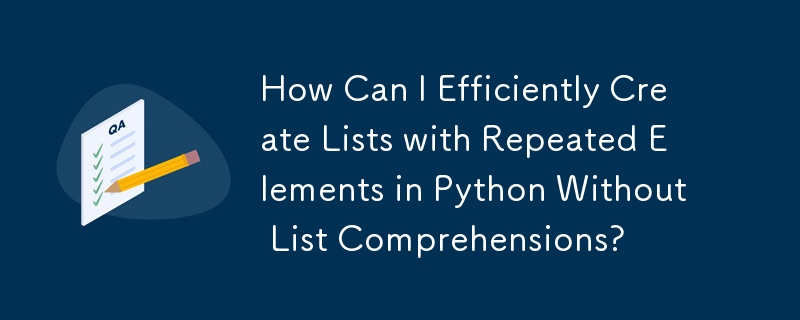Home >Backend Development >Python Tutorial >How Can I Efficiently Create Lists with Repeated Elements in Python Without List Comprehensions?
How Can I Efficiently Create Lists with Repeated Elements in Python Without List Comprehensions?
- Linda HamiltonOriginal
- 2024-12-19 14:21:131041browse

Generating Lists with Repeated Elements
In Python, creating multiple lists containing the same repeated elements can be achieved in various ways. This discussion explores a method that bypasses list comprehensions.
Solution:
Python provides the operator * to replicate elements. To create a list filled with n occurrences of element e, simply use the expression [e] * n.
Example:
e = 5 list_of_e = [e] * 10 # [5, 5, 5, 5, 5, 5, 5, 5, 5, 5]
Note:
If e is an empty list, this method will create a list with n references to the same empty list. Providing independent empty lists requires a different approach.
Performance Evaluation:
Although itertools.repeat() may initially appear faster, it requires converting to a list to perform comparisons. The operator * directly returns a list, resulting in better performance:
import timeit
n = 1000000
timeit.timeit('[0] * 10', number=n) # Faster
timeit.timeit('list(itertools.repeat(0, 10))', number=n) # Slower
Conclusion:
To create lists of repeated elements without list comprehensions, leverage the * operator, which offers a concise and efficient solution. When requiring lazy generation of elements, consider itertools.repeat().
The above is the detailed content of How Can I Efficiently Create Lists with Repeated Elements in Python Without List Comprehensions?. For more information, please follow other related articles on the PHP Chinese website!

